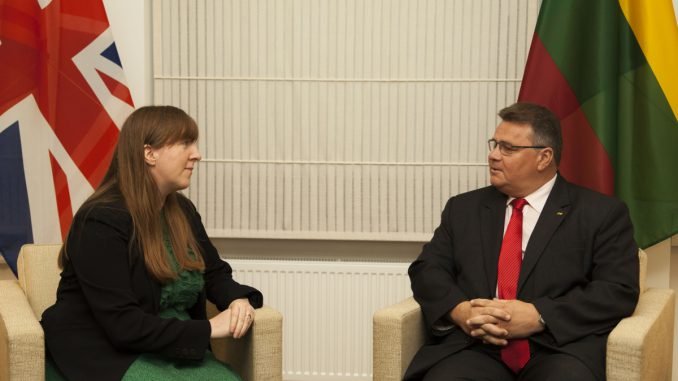
She told BNS in an interview that Britain was starting consultations with Lithuanian businesses about bilateral trade between the two countries after the UK’s withdrawal from the European Union.
According to the ambassador, Brexit is also opening opportunities for strengthening bilateral relations and the UK embassy is being expanded for that purpose.
BNS: How would you comment on Lithuania’s government reaction to Sergei Skripal’s poisoning?
Lawrence: We are enormously grateful for the solidarity that we have been shown by many many countries in Europe, in NATO, and region wider than that, and of course that includes the actions that the Lithuanian government announced.
We are very grateful for Lithuanian solidarity, for the statements they have made and the action they have taken.
BNS: One of the most important questions raised now is if London is planning to go after the dirty Russian oligarchs’ money.
Lawrence: We have legislation in place that allows us to tackle the proceeds of crime, or of human rights abuses that have been taking place anywhere which are held in London. Of course, anything that we do needs to follow the due process and the rule of law, so it will be taken forward as an investigation rather than anything arbitrary.
BNS: You met the Lithuanian Confederation of Industrialists recently to talk about UK trade policy plans after Brexit. What is your message to Lithuanian business?
Lawrence: My message is that we still want to continue to trade between the UK and Lithuania, to keep that relationship very much growing. The same is true for investment, we continue to welcome UK investments in Lithuania and Lithuanian investments into the UK. We had a good discussion in the Lithuanian Confederation of Industrialists about how some things would change once we leave the EU. But I think I got sense from business that there is still a very strong intention for the UK-Lithuania trade relationship to remain strong.
BNS: What does Brexit mean for bilateral relations?
Lawrence: Brexit obviously means that some things will be different. But it gives us a real opportunity on the bilateral side because while we are looking at how we leave the EU, we are also looking at the relationship with Lithuania bilaterally and discovering that there are a lot of areas where the relations can be increased. These are in particularly three sectors: security, defense, foreign policy is the first; science and innovation including links between businesses is the second; and culture and links between people is the third.
The more we look at opportunities that are there, the more we find appetite from the Lithuanian side and the more initiatives we are taking forward.
BNS: Is the embassy expanding?
Lawrence: Yes, the embassy is expanding. We most recently set up a new science and innovation officer who will cover all three Baltic states, and she is busy getting out and about talking to universities, academics, researchers, government and business here in Lithuania to scope how we can increase our links on science and research. So, we are continuing to grow as we find more areas to work on.
BNS: Your embassy is planning to visit 100 places in Lithuania this year. What is the plan?
Lawrence: The plan is to visit 100 places in Lithuania for the centenary, and to get out and about beyond just, say, Vilnius, Kaunas and Klaipėda, really to visit places all over Lithuania. For those of us who are British staff at the embassy, it’s an opportunity to explore the country we’re living in and for our local staff there is an opportunity to engage with their own country in a slightly different way.
But we all think Lithuania is just a beautiful, interesting, wonderful country and it’s great to have an opportunity and a challenge to get out and see as much of it as we possibly can.

Be the first to comment